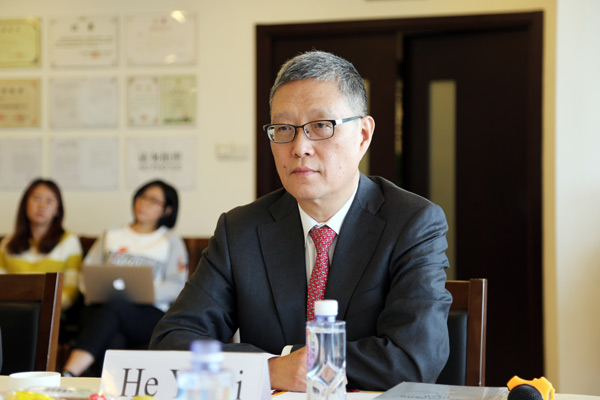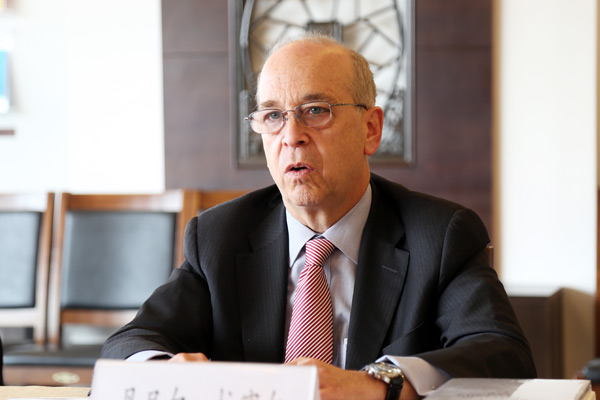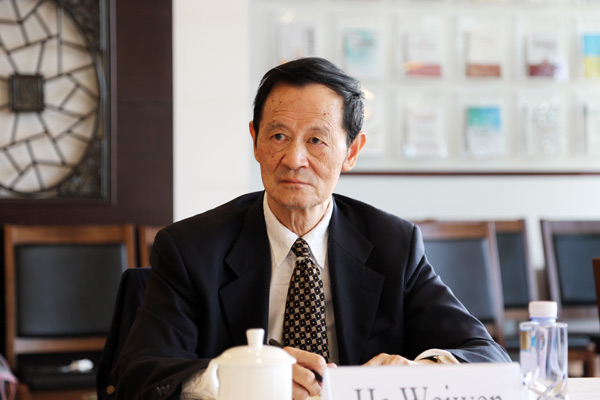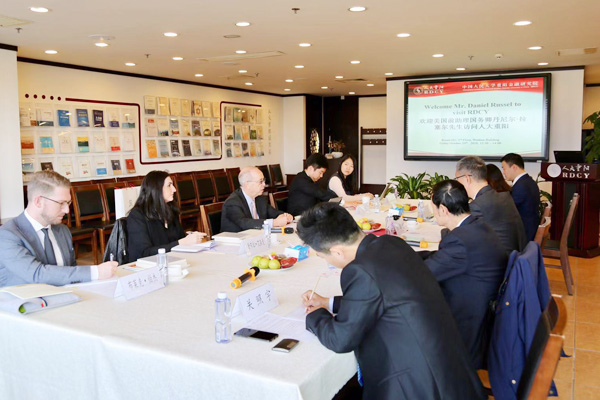Picture
Your Present Location: HOME> PictureFormer US Assistant Secretary of State Daniel Russel visits RDCY
On the afternoon of October 19th, Daniel Russel, former US Assistant Secretary of State for East Asian and Pacific Affairs and Vice President of International Security and Diplomacy of the Asia Society Policy Institute, visited Chongyang Institute for Financial Studies at Renmin University of China(RDCY), and had in-depth exchanges with He Yafei, former Deputy Minister of Ministry of Foreign Affairs, senior fellow at RDCY, Director of Research Center for Global Governance, and He Weiwen, former Economic and Commercial Counsellor of Chinese Consulate General in San Francisco and New York, senior fellow of RDCY, on China-US ties, the“Belt and Road”initiative, the exchanges and cooperation between Chinese and American think tanks. The meeting was hosted by Yang Qingqing, assistant to the dean and director of Research Cooperation Department of RDCY.

In the meeting, He Yafei said that China-US ties should be based on mutual benefit and win-win cooperation. No matter how strong China becomes, China won’t harm the interests of any country. China has its own views on history, overall situation and its role. There is no winner in the trade war, and China will always keep on opening-up. Also, he pointed out that the “Belt and Road” initiative is not about geopolitics, but a positive move by China to reduce the gap between the developed and developing countries, and help the developing countries build infrastructure under the background of industrialized escalation. he hope that the United States can actively join the initiative and make contributions to the promotion of global economic development in the future, He added.

Mr. Daniel Russel said that China and the United States need to recognize the root causes of the disputes. In short, the friction between China and the United States is mainly due to mutual mistrust. It is true that China and the United States have different styles. China likes to propose a framework concept, while the United States pays attention to details and substance. In the future, China and the United States should seek common ground while reserving differences. We have no idea to solve all problems overnight, but we can make a commitment and work together to continuously strengthen China-US ties on a healthy basis.

Mr. He Weiwen said that the think tank of the two sides should advise their governments not to intensify the current contradictions, and should conduct specific dialogues to discuss how the two countries will get along in the future. Regarding the “Belt and Road”, he said that many American companies and institutions have already participated in the construction of the “Belt and Road” and have achieved good benefits. For example, General Motors signed a $3.5 billion contract with China last year. In this aspect, US companies can take a step ahead of the government, and Chinese and American think tanks can also take joint research on how to cooperate under the framework of the “Belt and Road”.

Debra Eisenman, Executive Director of the Asia Society Policy Institute, Qian Jing, consultant to the Chairman and researcher of the Asia Society Policy Institute, Blake Berger, assistant to Daniel Russel, Wang Peng and Guan Zhaoyu, associate research fellows at RDCY, and assistant research fellow Yao Le, attended the meeting.
Founded in 2014, the Asia Society Policy Institute (ASPI) has grown to be the most authoritative private research institution on Asian policy in the United States. It is a non-profit, non-partisan, educational and world-leading think tank. As a unique think tank focusing on the rise of Asia, the institute aims to deal with the major policy challenges facing Asia-Pacific region in terms of security, prosperity and sustainable development, and to integrate the common values and concepts of the rise of Asia-Pacific region. By convening summits of important thought leaders from Asia, the United States, and Europe, as well as other forms of public diplomacy, the institute bridges the gap between countries and find solutions to the rise of Asia and global challenges. The institute brings together political and business leaders and scholars from the US and Asia. Former Australian Prime Minister Kevin Rudd was the first dean.























































































 京公网安备 11010802037854号
京公网安备 11010802037854号





